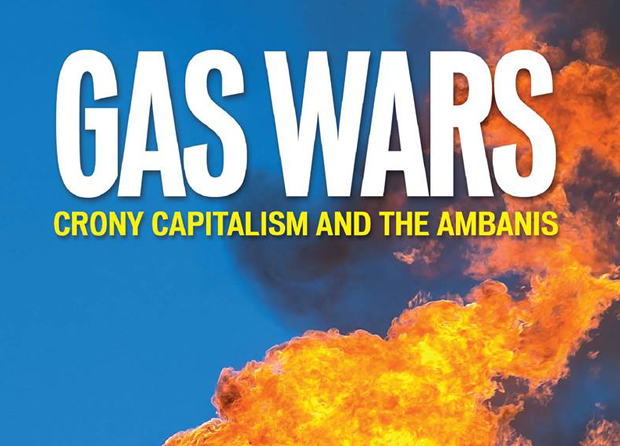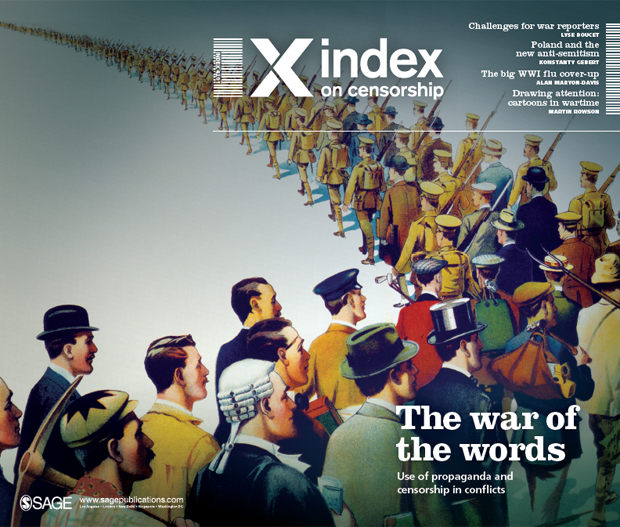24 Apr 2014 | India, News, Politics and Society, Religion and Culture

“Gas Wars — Crony Capitalism and the Ambanis” is journalists Paranjay Guha Thakurta, Subir Ghosh and Jyotirmoy Chaudhuri’s collaborative effort exposing one of India’s biggest business conglomerates’ murky dealings with the government.
The authors detail how a hydrocarbon production sharing contract in Krishna Godavari, off the Bay of Bengal, in Andhra Pradesh, was allegedly rigged to benefit Reliance Industries Limited (RIL) headed by Mukesh Ambani, at significant cost to the public exchequer. The book contends that high ranking government officials, including ministers, aided and abetted the pillage of public resources.
A fire-and-brimstone attorney’s notice from RIL arrived the day after the book was launched. It had quite an eerie feel to it. The notice started with a disclaimer about the Reliance groups’ highest regards for constitutional rights including freedom of expression, and then accused the authors of a deep-rooted conspiracy to malign the company’s reputation. It took strong exception to the book’s title and went on to allege that the contents are nothing but malicious canards. Nothing sort of an unconditional public apology would mitigate the harm caused, failing which, criminal and civil proceedings would be unleashed. Drawing lessons from the Wendy Doniger episode, the notice threw out a wide net. It included not only Authors Upfront and FEEl Books Private Ltd, the e-book publisher and distributors, but also “electronic distributors” like Flipkart and Amazon.in. Even the Foundation for Media Professionals, a non-governmental organisation which forwarded e-invites for the launch event, was not spared. A second notice in the same vein, this time from RNRL, followed soon after.
Why does the book roil the Ambanis? In an interview, Guha Thakurta, one of the authors, revealed that the book delves into how both the central and the Gujarat governments worked hand-in-glove with the Reliance companies in structuring the deal. In effect, the government kowtowed to the companies’ diktats, the authors assert. It went out on a limb to hike the price of gas, and was stopped in its tracks by the Election Commission.
Moreover, it has become a hot-button political issue since the Aam Aadmi Party, which is contesting the elections on an anti-corruption plank, has left no stone unturned to relentlessly question the Ambanis and Gujarat chief minister Narendra Modi, who is running for prime minister. The questions have so unsettled the Reliance companies that they have taken to an “Izzat (honour) campaign” and SMS blitz to convince Indians of its innocence. Further, the companies claim in court that they are victims of a “honey trap”- apparently the government isn’t the custodian of the country’s natural resources and had lured them with false promises.
Guha Thakurta maintains that he has acted in the finest traditions of fairness and journalistic integrity. Senior officials of the companies have been interviewed, their views, refutations and assertions–everything has been presented. But his travails in publishing the book provide cause for consternation. Self-publication was the sole option, if one goes by Bloomsbury India‘s craven surrender. For the record, not only did it withdraw a book which would have exposed how India’s national airline was bled dry, but went ahead and apologised to the minister who threatened to sue for libel. A leading national publisher had been approached, and a deal had been worked out, but Guha Thakurta decided to go solo when substantial changes were demanded.
For Reliance, intimidating anyone who isn’t writing hagiographies of Dhirubhai Ambani–the company’s founder–is par for the course; one is a worse offender for even whispering anything against their cavorting with officials in the top echelons of government. And their modus operandi of silencing criticism reveals the extent of crony capitalism.
In its May 2013 issue, Caravan magazine published a cover story on India’s Attorney General. It bared details about how his opinions to the government were tailored to help the Ambanis wiggle out of an investigation into a graft scandal. Interestingly, three legal notices, each more threatening than the other, reached the magazine in the month of April, demanding complete silence. Caravan took them head on, but not every publisher would have the wherewithal to resist impending SLAPP suits.
The threats to Caravan were benign if compared with what the Ambanis did to “The Polyester Prince”, Hamish McDonald’s 1998 biography of Dhirubhai. The plight of that book is a true testament to the Ambanis’ power of insidious censorship. Incessant threats of injunctions from every high court in India ensured that the book quietly vanished off the shelves.
And why not? McDonald had quoted him — “I don’t break laws, I make laws.”
UPDATE:
If there were any doubts as to the extent of Reliance Industries’ determination to suppress the tiniest whisper of criticism, they are dispelled by the latest fusillade hurled against the authors. This comes in the form of a couple of fresh legal notices laden with preposterous claims and egregious threats.
The first one, dated 22 April, cherrypicks random, disjointed passages from the book to make out a case for libel. Suffice it to say, even prima facie innocuous statements have been included.
Dated 23 April, the second one accuses the authors of malevolent mendacity in publishing and publicising their “pamphlet” (yes, that’s the term used to substantiate the charges of the book being a piece of malicious propaganda), and goes on to claim that even the launch event was designed to malign the companies.
At that event, Guha Thakurta had quoted former Governor of West Bengal Gopalkrishna Gandhi’s statement that “Reliance was a parallel state, brazenly exercising total control over the country’s resources”. But Reliance hasn’t trained its guns on Gandhi; instead it accuses the author of slander. It is not pusillanimity but very sound legal strategy — the modus operandi of SLAPP suits, which the company adopts because taking on Gandhi, a widely respected and renowned public figure, would backfire.
Playing both judge and jury, Reliance determines that a sum of INR 100 crore (10 billion) as “token damages”, to be paid within ten days, would be just restitution. Never before has any plaintiff arrogated to itself such a right even before going to court.
The next claim is much more sinister. The authors are directed to remove all traces of “publicity material” — both in print and on the internet, including the website http://www.gaswars.in/. This patently means that even this particular report has to be taken off. Since when have two corporations been so imperious as to stake claim to sovereignty over the internet?
An earlier version of this article identified the basin in question in the production sharing contract as one Kasturba Gandhi in Gujarat, when it should be Krishna Godavari, off the Bay of Bengal, in Andhra Pradesh. An earlier version also stated that both Reliance Industries Limited (RIL) headed by Mukesh Ambani, and Reliance Natural Resources Limited (RNRL) headed by Anil Ambani, were involved in the sharing contract, when it should only be RIL. This has been corrected.
This article was originally posted on 24 April 2014 at indexoncensorship.org
16 Apr 2014 | Events

Join us at the Hay Festival to debate what happens to the truth during wars and conflicts. Where is the line between national security and public information? Is it ever right not to tell the whole truth?
These issues are discussed in the latest Index on Censorship magazine, looking back to World War I, and bringing the debate up to date with discussions on war reporting in Syria and Afghanistan today.
This Index on Censorship magazine platform at Hay features David Aaronovitch (columnist/broadcaster and Index chair), Alan Maryon-Davis (writer/broadcaster and doctor), Leanne Green (Imperial War Museum) and is chaired by Rachael Jolley (editor, Index on Censorship magazine).
WAR AND PROPAGANDA launches the Spring edition of Index on Censorship magazine with its special report on the use of propaganda and censorship during conflicts, marking the centenary of the beginning of World War I. Each attendee will receive a free copy of the magazine.
When: Sunday 25th May, 7:00pm
Where: Llwyfan Cymru – Wales Stage, Hay Festival
Tickets: Reserve your tickets (public booking opens Wednesday 9th April, 10pm)
28 Mar 2014 | News, Politics and Society, Religion and Culture, United Kingdom, Young Writers / Artists Programme

(Illustration: Shutterstock)
“The media tells you what to think!”
That’s a basic criticism of Western journalism, whether it’s of the “CNN controls your mind” or “Left Liberal Elites have monopolised the agenda” variety. Most people reject this, rightly, as a straw-man. We pride ourselves on our ability to sift information, reject weak arguments and come to our own points of view.
A more worrying criticism is that the news directs what you think about. Decisions to give Story X prominence and headlines, and to bury or spike Story Y, mean most of us can only encounter X. Newsworthy stories become obscure if drowned out by others or omitted entirely. We’re denied investigation or campaigning on vital issues because nobody knows they exist.
In Britain this is not what we typically mean by ‘censorship’, not the recourse of despots or prudes. Nevertheless, self-censorship with market and readership in mind denies all but the most devout news-addict important stories. And without the news we can’t have comment pieces, columns, Twitter debates and opinion blogs.
Consider the EuroMaidan protests in Kiev through spring. Coverage gave the impression of a pro-EU crowd led by a heavyweight champion, with a worrying fringe of violent nationalists – Svoboda and Right Sector. This followed the ‘mainstream-extremist’ simplification presented in Egypt, Syria and Libya. Other crucial groups were ignored: LGBT activists set up the protest’s hotlines, feminists ran the makeshift hospitals, Afghan war veterans defended them.
The world’s focus on Kiev and Crimea drove other issues from the spotlight. The Syrian civil war has hardly featured recently, but that conflict has far more casualties, worse upheaval and more immediate consequences for Britain. Refugees are currently en route to claim asylum – this is the last we heard. Similarly, the Philippines dominated the winter’s news after Typhoon Haiyan. Now it’s forgotten in favour of flight MH370 despite the catastrophic ongoing humanitarian crisis, again with more lives at stake.
The Arab Spring is itself a good example of one narrative deafening public consciousness. How many of us knew that at the same time as protests ignited Yemen and Syria in July 2011, Malaysia’s government gassed peaceful crowds and arrested 1,400 protesters after tens of thousands marched for electoral reform? It’s tempting to wonder whether greater coverage, and greater international pressure, could have supported the democratic reforms demanded.
Closer to home, consider the brief uproar caused by the 2013 UK policing bill, drafted to outlaw ‘annoyance and nuisance’ and give police arbitrary powers to ban groups from protest areas. Although the drafts were publicly available, and campaign groups voiced outrage swiftly, left-wing papers took notice only after the bill had passed the Commons. The bill was softened, not by popular pressure or national debate, but by a few conscientious Lords.
Readers could forgive the media for prioritising other stories if they are more pressing. When headlines are crowded by non-events, however, this seems a poor excuse. The British news spectrum was recently obsessed with Labour politicians Harriet Harman and Patricia Hewitt, who worked for the National Council for Civil Liberties (now ‘Liberty’) in the 1970s. That council granted affiliate status to the now-banned Paedophile Information Exchange (PIE). The Daily Mail made a huge splash about its PIE investigation in February, despite uncovering no new information. That paper alone had reported the same story in 1983, 2009, 2012 and 2013. Eventually the BBC, online world and print media all covered the controversy, meaning more worthy issues lost precedence.
Madeleine McCann has dominated countless front pages, reporters chewing over the barest scraps of Portuguese police leaks. No real progress has been made for years. Pundits admit the story retains prominence largely because the McCanns are photogenic, and similar stories would have fallen off the agenda. There are hundreds of similar unsolved child disappearances, just from the UK. Drug scares, MMR vaccine hysteria, celeb gossip and royal gaffes (not to mention Diana conspiracies) complete the non-story roster.
If this seems regrettable but harmless, consider sexual violence. Teacher-child abuse, violent assaults and gang attacks deserve coverage, but their sheer news monopoly perpetuates the public’s false idea of ‘real rape’. Most sexual abuse is between couples or acquaintances: campaigners have shown the myth that ‘real rape’ must involve a violent stranger impedes both prosecution and victim support.
There is no silver bullet, just as no one news organisation can really be blamed for censorship by omission. Few people want or need constant updates on upheaval in South Sudan or Somalia – but we could be reminded they’re happening at all. Editors will always reflect on what is vogue, what will sell, and a diverse free press ensures a broad range of stories. Perhaps the rise of online citizen-reporting can bridge the gap. Nevertheless, the danger of noteworthy events falling into obscurity should niggle at the back of the mind – for those who know enough to think about it.
This article was posted on March 28, 2014 at indexoncensorship.org
19 Mar 2014 | China, Digital Freedom

WeChat was the darling of the Chinese start-up scene, the sexy competitor to Weibo domestically, and Twitter and WhatsApp, on the global stage. The design of the website meant that freedom of speech was for a while preserved – mainly because messages between users remained relatively private and insulated from the wider internet. But Beijing has orchestrated a sudden clampdown on the service : closing several high-profile accounts, some with hundreds of thousands of followers.
When users access the banned accounts, a Chinese message appears, translated as:
Due to reports from users that have been confirmed, all functions for this public account have been shut down for violating regulations. We suggest you cancel your subscription.
Users operating the site in English received a slightly different message – notably without any mention of “We suggest you cancel the subscription.”
WeChat started as a messaging service – however in 2012 the company behind the app – Tencent, introduced public accounts so that subscribers could follow celebrities, brands and well-known journalists and media outlets.
All of these subscription-based accounts on WeChat come with a “report” button at the bottom right of the content page. Some accounts had hundreds of thousands of subscribers.
Tencent has not stated its reasons for shutting down the accounts. The Chinese authorities have previously warned users that “spreading rumours” online is a crime – “spreading rumours” being a euphemism for speculation about corruption amongst senior Chinese officials.
Users of WeChat had already reported that the app blocked certain sensitive words.
Analysts have said they are not surprised by the censorship – although admit that WeChat has survived longer than most websites in China without restrictions on freedom of speech.
“I don’t find the suspensions surprising, though it’s still disheartening,” Jason Ng, author of Blocked on Weibo and social media expert.
“It would’ve been foolish of authorities not to regulate WeChat, like they do all other social media when they clearly have the capability and the will to do so.” Ng added “The only thing holding them back perhaps was a lack of resources.”
Ng pointed to the original “insular nature” of WeChat messaging, meanig it was less likely for “rumours” to go viral. However since 2012, the introduction of “new public accounts had clearly changed the authorities assumptions [about WeChat]”.
Yunchao Wen, a freedom of speech activist and Chinese social media expert told Index
“The Chinese government have never leaves any permanent space for political expression – sometimes they don’t find them straight away, sometimes they’re too busy dealing with other issues, but they are always censored.”
Wen also stressed that more than two hundred people were jailed by the Chinese authorities over political or human rights issues in 2013, as well as suggesting that the news had been “buried” while journalists were distracted.
“They closed down the Wechat public accounts on the last day of 12th National People’s Congress, trying to make sure foreign journalists didn’t notice,” said Wen.
Speculating on whether the censorship campaign will have hit WeChat commercially, Ng was sceptical.
“I don’t think it’s hit them too hard; it was only 50 or so accounts.” Ng also quipped “One Lionel Messi commercial and this event will probably be forgotten,” referring to the high profile celebrites who are regularly featured on the site.
WeChat was launched in early 2011, reportedly attracting 100 million registered users in its first fifteen months. The company revealed that it had 270 million active monthly users, up 124% from the previous year.
Sina Weibo, a key competitor for WeChat, is gearing up for an IPO on the Nasdaq – targeted to raise $500m. However investors have been warned that China’s censorship policies may negatively affect business – with several paragraphs in their sales materials relating to censorship.
Sina Weibo faced similar censorship to WeChat in 2012, telling investors “we had to disable the comment feature on our platform for three days to clean up feeds related to certain rumors.” Users were speculating about a possible coup d’etat in Beijing.
This article was published on 19 March 2014 at indexoncensorship.org




